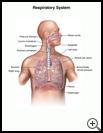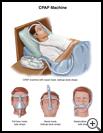
Sleep Apnea
________________________________________________________________________
KEY POINTS
- Sleep apnea means that you stop breathing many times while you sleep.
- Untreated sleep apnea may increase your risk of cardiac rhythm problems and sudden death. Also, untreated sleep apnea may increase your risk of high blood pressure, heart attack, and stroke.
- The most common treatment for sleep apnea is a CPAP machine. Treatment may also include losing weight.
________________________________________________________________________
What is sleep apnea?
Sleep apnea is a serious medical condition. If you have it, you stop breathing for more than 10 seconds at a time many times while you sleep. If you have sleep apnea, your body gets less oxygen when you sleep. This causes you to wake up often to breathe, so you do not get restful sleep. Another term for this problem is obstructive sleep apnea.
Sleep apnea is more common in men than in women, and in people over the age of 50. It’s also more common in people who are overweight, but many people with normal weight have sleep apnea.
It is very important to treat sleep apnea. Untreated sleep apnea may increase your risk of high blood pressure, heart attack, stroke, cardiac rhythm problems, and sudden death.
What is the cause?
During normal sleep, your throat muscles relax. If you have sleep apnea, your airway closes during sleep. The closing of your airway slows or stops the movement of air, and the amount of oxygen in your blood drops. The drop in oxygen causes your brain to send a signal for you to wake up and start breathing again. This cycle of not breathing and then waking up to breathe may happen as often as 30 or more times an hour. This condition will also cause you to snore loudly. Generally you will not remember waking up, but you may feel tired and sleepy during the day.
Things that can cause or worsen sleep apnea are:
- A narrow airway, from being overweight or having a narrow bone structure in your neck
- A partial blockage of the airway from polyps (noncancerous growths), tumors, or enlarged tongue or tonsils
- Smoking
- Drinking alcohol
- Allergies or nasal congestion
- Sedatives, sleeping pills, and pain medications
- Heartburn
- Older age
Often sleep apnea occurs in families.
What are the symptoms?
Symptoms may include:
- Loud snoring followed by pauses in breathing and loud gasps
- Not feeling rested when you wake up
- Morning headaches
- Feeling tired and sleepy during the day (falling asleep watching TV)
- Trouble concentrating
- Anxiety, irritability, or depression
- Falling asleep driving or at red lights
Many people who snore do not have sleep apnea, but nearly everyone who has sleep apnea snores.
How is it diagnosed?
Your healthcare provider will ask about your symptoms and medical history, and will examine you. Your healthcare provider may suggest that you have a sleep study in a sleep lab or in your home. For the sleep study, you will have a continuous, all-night recording of your breathing, eye movements, muscle tone, blood oxygen levels, heart rate and rhythm, and brain waves. The study will show if the movement of air slows or stops while you sleep. It will also show how often this happens during sleep.
How is it treated?
The most common treatment is use of a machine that uses air flow keep your airway open to help you breathe better while you sleep. This treatment is called continuous positive airway pressure (CPAP). There are several types of CPAP machines. Your sleep specialist can advise which machine will work best for you and help you learn how to use it.
How much pressure you need to fix your sleep apnea is determined by the sleep study. You may need follow up visits with a sleep specialist to see if adjustments to the CPAP machine are needed.
If you cannot use CPAP, a mouth guard (mandibular repositioning device) that moves the lower jaw forward may help. Your dentist who knows about apnea treatment can make a guard for you.
If you are overweight, your healthcare provider may suggest a weight-loss program or treatment. You may have trouble losing weight because you are always tired and lack energy to exercise. Use of the CPAP machine may help you feel more rested, have more energy, and be able to make the changes to help you lose weight. If you are very heavy, you can talk to your healthcare provider about weight loss surgery.
If you smoke, quitting smoking may help improve your sleep apnea.
Sleep apnea may sometimes be treated with surgery. Several kinds of surgery may help:
- Removing polyps or opening the sinus passages in your nose
- Removing your tonsils
- Moving your lower jaw (mandible) forward
- Inserting a pacemaker to stimulate your tongue (hypoglossal nerve stimulation)
If your sleep apnea can be treated with surgery or if it is caused by being overweight and you lose weight, sleep apnea can be cured. For most people, however, sleep apnea will be a long time problem and the CPAP machine will need to be used for the rest of their lives.
How can I take care of myself?
Follow the directions from your healthcare provider for using and cleaning your CPAP machine. Do not change the CPAP settings without your healthcare provider's approval. CPAP machines have computer cards or modems that will allow your doctor to determine how many nights you used CPAP and how well the CPAP unit is treating your sleep apnea. Follow the full course of treatment from your healthcare provider. Ask your healthcare provider:
- How to take care of yourself at home
- What symptoms or problems you should watch for and what to do if you have them
Make sure you know when you should come back for a checkup.
How can I help prevent sleep apnea?
Talk to your healthcare provider about your concerns and your lifestyle habits. This may help you to identify causes for your sleep problem and will help you know what you can do to help prevent sleep apnea. This may include:
- Eat a healthy diet.
- Try to keep a healthy weight. If you are overweight, lose weight.
- Stay fit with the right kind of exercise for you.
- If you smoke, try to quit. Talk to your healthcare provider about ways to quit smoking.
- If you want to drink alcohol, ask your healthcare provider how much is safe for you to drink.
You can get more information from:
- American Academy of Sleep Medicine
708-492-0930
http://www.aasmnet.org



